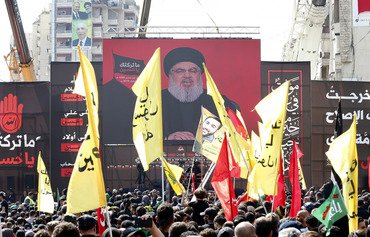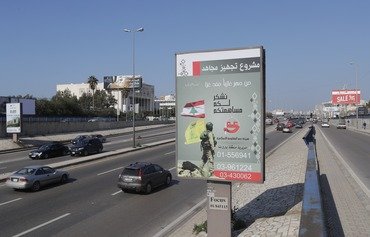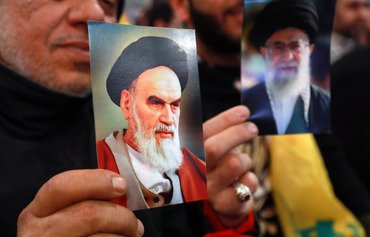New US sanctions on seven Lebanese companies with ties to Iran-funded militia Hizbullah will help curb its influence in the region and curtail its illegal activities, experts tell Al-Mashareq.
The US Treasury on October 4th designated Lebanese national Mohammed al-Amin as a Specially Designated Global Terrorist and sanctioned seven of his companies for providing material support for Hizbullah, one of the latest in a series of penalties aimed at curtailing the militant group's finances.
On October 15th, the US Justice Department also designated Hizbullah a "transnational crime organisation", a move which will enable broader scrutiny into its role outside Lebanon.
The Office of Foreign Assets Control (OFAC) said that Sierra Gas SAL Offshore, Lama Foods SARL, Lama Foods International Offshore SAL, Impulse SARL, Impulse International SAL Offshore, M. Marine SAL Offshore, and Thaingui SAL Offshore are all now subject to US asset freezes.
All seven entities are owned or controlled by al-Amin.
Al-Amin was designated "for providing material support to Hizbullah insider and financier Adham Husayn Tabaja", OFAC said.
Tabaja has been under sanctions since June 2015 for working for Hizbullah and his relationship with senior officials of the group.
In addition to his direct support to Tabaja, al-Amin has been involved in financial activities with Muhammad Fallah Kallas, whom OFAC designated in October 2016 for providing financial services to, or in support of Tabaja.
Al-Amin also has business relationships with Ali Mohammad Qansu and Jihad Mohammad Qansu, who were also targeted with sanctions in February.
In May, the US Treasury imposed new sanctions on Hizbullah secretary-general Hassan Nasrallah, his deputy Naim Qasim and other individuals linked to Hizbullah.
"Hizbullah is an Iranian-proxy, and this administration is focused on exposing and disrupting its terrorist funding networks," said Sigal Mandelker, Under Secretary of US Treasury for Terrorism and Financial Intelligence.
"We are exerting extraordinary pressure on Hizbullah financiers like Tabaja to halt their pernicious activities in Lebanon and beyond," he said.
Undermining Hizbullah
"The new sanctions will have a significant demoralising effect, having been imposed after Hizbullah was designated as a terrorist group involved in financial crimes, such as money laundering and drug trafficking," said strategic and security researcher Brig. Gen. Nizar Abdul Qadir, a retired military officer.
The sanctions "undermine Hizbullah's influence in Lebanon and the Arab world", he told Al-Mashareq.
"[Hizbullah] is considered an Iranian, not a Lebanese brigade, funded by Iran to implement its political agenda in the region," he said.
The new sanctions expose the militia's activities to the Lebanese public and all the peoples of the region, he added.
They restrict the movement of some of Hizbullah's core political and financial cadres, he said, therefore hindering the militia's ability to carry out operations.
Hizbullah has built a secretive international network that extends from South America to Africa to Southeast Asia, to transport and transfer funds through individuals affiliated with it who are not yet exposed, said Abdul Qadir.
"However, the noose is tightening around this network which is being pursued by US security agencies," he said.
Drying up sources of funding from Iran
Similarly, Iran's financing of the group will be curtailed as result of the sanctions, Abdul Qadir said.
"Hizbullah leaders are very apprehensive about the threats looming over them as a result of the sanctions and the militia's aggressive policy, even though they will not admit to these fears," he said.
"Iranian financing of Hizbullah's military, political and media activities is conducted through cash deposits and does not pass through banks, because of the sanctions on Iran," said Harith Suleiman, a Lebanese Shia political analyst opposed to Hizbullah.
The Iranian regime continues to be the prime source of funding for Hizbullah, he told Al-Mashareq.
"While the sanctions will have an impact on the militia to a certain extent, what is required to put an end to its activities and businesses is to dry up its sources of funding from Iran," he said.
"The new sanctions are one of the tools that will put enormous pressure on Hizbullah," political analyst Nadim Koteich told Al-Mashareq.
They target individuals who operate "within the militia's closed network and include financiers, businessmen, diamond dealers and journalists", he said.
"The sanctions are part of an extensive tool kit that will [be used] to encircle and undermine the influence of the militia and its leaders in Lebanon and Arab [countries] where it has a presence," he said.
They also will place restrictions on its sources of funding for terror acts and illegal drug trafficking, "all of which are directed by Iran", he said.

![Supporters of Lebanese militia Hizbullah take part in a parade to mark Ashura on September 20th in Beirut. Newly imposed sanctions by the US on Hizbullah will help curb the Iran-backed militia's malign activities in the region by cutting off its sources of funding. [Anwar Amro/AFP]](/cnmi_am/images/2018/10/22/15061-Lebanon-Beirut-Hizbullah-600_384.jpg)







The game of oil between Iran and Saudi Arabia is waiting for an error from Turkey in the case related to the killing of journalist Khashoggi, and Erdogan’s attempts and insistence on blaming Mohammed ben Salman for killing him. Erdogan thinks that with this blame, he will take revenge on Saudi Arabia, as we can see from all Muslim Brotherhood members everywhere. Anyone watching al-Jazeera TV station will know the instructions of the Muslim Brotherhood’s International Organization to all members in Qatar, Turkey and Britain about the need to embarrass Saudi Arabia. This has the benefit that Muslim Brotherhood members in al-Jazeera have now put Egypt aside to focus on Saudi Arabia. Erdogan foolishly thinks that King Salman will sacrifice his son Mohemmed and let him face trial for Khashoggi's murder. He doesn’t know that King Salman will severely punish anyone who addresses this murder case in a way that is detrimental to Saudi Arabia, including cutting off oil supplies to these countries. Thus, the interests of Saudi Arabia and Iran converge by violently shaking the world’s economy. Magdi, November 4th, 2018.
Reply1 Comment(s)